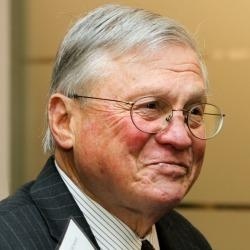Columbia College | Columbia University in the City of New York
Stanley B. Lubman ’55, LAW’70, Expert in Chinese Law and Law Reform

Lubman was a man who relished the pleasures of life. He once proclaimed that he was determined not to be like economist John Maynard Keynes, who reportedly said that his only regret was “that I did not drink more champagne.”
Born in the Bronx on March 29, 1934, Lubman was a graduate of Bronx Science and earned a L.L.B. (1958), L.L.M. (1959) and J.S.D. (1970), all from the Law School. He received a two-year fellowship to study at École de Droit, University of Paris; he also received a four-year fellowship from the Rockefeller and Ford Foundations to study Chinese language and study and research Chinese Law at Columbia and in Hong Kong.
Lubman’s interest in China began in summer 1959 in Vienna, where he observed the Chinese delegation at the Communist Youth Festival, which was being held for the first time outside the Communist bloc. He spent much of the 1959–60 academic year in Paris reading not about French law but about China.
Lubman taught law at UC Berkeley, Yale, Harvard, Columbia and Stanford law schools and also lectured at the University of Oxford, University of Heidelberg, and The School of Oriental and African Studies at the University of London. He produced a wide range of scholarship covering such varied topics as dispute resolution, administrative law and American policy toward China.
He was a prolific author in the field as well. Among Lubman’s most notable publications are China’s Legal Reforms: (Studies on Contemporary China) (1996); Bird in a Cage: Legal Reform in China after Mao (2000); and Engaging the Law in China: State, Society and Possibilities for Justice (2005). Lubman also wrote frequently about Chinese legal issues in the media, including a recurring online column that ran in the “China Real Time Report” in The Wall Street Journal.
Lubman’s impact extended beyond academia. In addition to teaching and mentoring many of today’s leading Western and Chinese scholars and practitioners of Chinese law, he maintained a full-time China law practice, first on his own and then working at major law firms, advising Western companies on their business dealings with China.
From 1978 to 1997, while continuing his academic work, he was head of the China Group at Allen & Overy; a partner with Thelen, Marrin, Johnson & Bridges; a partner with Heller, Ehrman, White & McAuliffe; and in individual practice in Washington, D.C., and Berkeley. He was also an adviser to The Asia Foundation from 1998 to 2011, and was a partner with his wife, Judith, in the trading company Lubman & Co., which specialized in trade with China. In 2014, The Columbia Law School Association presented Lubman with the annual Distinguished Columbian in Teaching Award.
In addition to his wife, Lubman is survived by a daughter, Sarah; son, James; and four grandchildren.
— Alex Sachare ’71
Issue Contents
Published three times a year by Columbia College for alumni, students, faculty, parents and friends.
Columbia Alumni Center
622 W. 113th St., MC 4530, 6th Fl.
New York, NY 10025
212-851-7852
cct@columbia.edu
Columbia Alumni Center
622 W. 113th St., MC 4530, 4th Fl.
New York, NY 10025
212-851-7488
ccalumni@columbia.edu

